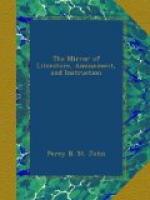Abbas received from his subjects and posterity the surname of THE GREAT. Bebut the Ambitious was presently known only by the title of Bebut THE INFAMOUS. It is said, he was a short time after stabbed by the son of the unfortunate jeweller, whom he had so unjustly condemned to death when divan-beghi. Thus were the words of the poet Ferdusi verified. His first fault was the cause of all the others, and their common punishment.—Oriental Herald.
[4] Zekath is the Persian
name for the tithe of alms which the
Koran enjoins to be distributed
among the poor.
[5] Schah-nameh signifies
the royal book. It was composed by
order of Mahmoud the Gaznevide,
and contains 60,000 distichs,
the history of the ancient
sovereigns of Persia.
[6] That is to say, the Castle
of the Dead. It was situated in
the Mazanderan, (the ancient
Hircania), and had been the abode
of the Old Man of the Mountain,
the Prince of Assassins.
[7] A king coolly ordering one of his subjects to cut off the head of his own child, and being obeyed, is a circumstance so monstrous, that it would appear beyond all possibility, if it were not supported by numerous examples. But, incredible as it may seem, it only paints the common manners of a court, where tyranny, and the vices which it engenders, altogether extinguish the influence of nature.
* * * * *
NOTES OF A READER.
* * * * *
MURDER
We are not accustomed to study the clap-traps of the day, but the following observations, on our first reading of them, came so forcibly on our imagination, that we then resolved to insert them in our columns whenever an opportunity should offer; and as the public are now alive on the subject, none can be better than the present. We should add, they are taken from the third edition of a valuable work on Home, written by a lady:—
“I think,” says our authoress, “we are quite mistaken in our estimate of the Italian character, in one respect. Murder is generally committed in the sudden impulse of ungovernable passion, not with the slow premeditation of deliberate revenge. That it is too common a termination of Italian quarrels, it would be vain to deny; and it is equally true, that however Englishmen may fall out, or however angry they may be, drunk or sober, they never think of stabbing, but are always content with beating each other. But in England murders are generally committed in cold blood, and for the sake of plunder. In Italy they are more frequently perpetrated in the moment of exasperation, and for the gratification of the passions. An Italian will pilfer or steal, cheat or defraud you, in any way he can. He would rob you if he had courage; but he seldom murders for the sake of gain. In proof of this, almost all the




